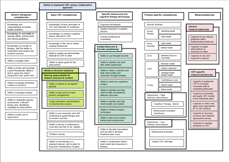Welcome to the CBT competences framework for depression and anxiety disorders. This site gives open access to the framework and to background documentation that explains how to use the framework.
A brief description of CBT and the competence framework
The framework describes the various activities which need to be brought together in order to carry out CBT effectively and in line with best practice.
It is helpful to bear in mind that CBT is guided by a knowledge base and a philosophy, and that its techniques flow from this. Practitioners need to understand the rationale for what they are doing, and not treat CBT as a set of techniques. One of the most important features of CBT is that it is intended to be collaborative - the client is encouraged to share responsibility for the work, and to be an active co-participant in their therapy. A second principle is that, although a structured therapy, it works best if therapists consistently maintain a sense that clients need to understand themselves through a process of 'guided-discovery', so that they find out about themselves for themselves. This leads to a third principle, which is that CBT should help clients learn skills which enable them to cope with future adversity in a more effective way.
CBT is an approach that is intended to help clients to take stock of the way they behave and the way they think about themselves and others, and to see whether there are alternative perspectives and actions that could be more useful to them. It is not about correcting "faulty" thoughts or thinking positively.
The framework locates competences across five domains. This is intended to help users see how the various activities fit together. It is not a hierarchical model, with some domains being more important or requiring more skill than others. Any intervention will require clinicians to bring together knowledge and skills from all domains. This observation applies both to "low-intensity" intervention (such as guided CBT self-help for depression) and to "high-intensity" interventions (such as Beck's CBT model for depression).
Overview of the Framework
There are two background documents introducing the framework and its application It is important to read the background documentation before making use of the map and the competence, as this will help you to understand the thinking behind the framework.
Background document for clinicians and commissioners - this is essential reading for users of the framework. It explains the principles which guided the development of the framework, and the ways in which it can be applied
Background document for service users - this is a non-technical description of what service users can expect from a therapist if they are offered a CBT intervention
Downloading the competences
We have tried to make downloading the lists of competences as easy as possible - you have two options:
1) To download competences from the map: placing the cursor over any of the boxes in the map links you to the competences. To see the competences associated with a specific activity, just click on the relevant box
A pdf (printable) version of the map can be downloaded here.
2) To download competence lists independently of the map, click on the relevant link below:
Generic Therapeutic Competences
Specific Behavioural and Cognitive Therapy Competences
Full list of manuals and source materials used to identify the competences
Self Assessment Tool
The self-assessment tool allows you to gauge your current level of competence in CBT against the framework. The intent is to help you identify areas of strength and areas where further training might be helpful.
Click here to download the manual
Click here to download the self-assessment tool itself.
Because some users have experienced difficulties with macros when using the tool we have also prepared a troubleshooting guide. Click here to access the Troubleshooting Guide.
We would welcome any feedback on the framework (including feedback on the functionality of the website itself) - please email a.roth@ucl.ac.uk to give feedback
 Close
Close


